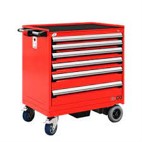
A toolbox is a smart investment for any DIY enthusiast or full-time tradesman. It will allow you to store and organize your tools. Rather than tossing them on an open counter, you can place your tools in a toolbox. While all toolboxes have storage space such as drawers, however, they are available in different types. Here are six important things to consider when choosing a toolbox.
#1) Mobile vs Stationary
Some toolboxes are stationary, whereas others are mobile. Stationary toolboxes are immobile. Once placed in a given area, you won’t be able to easily move them. Mobile toolboxes, on the other hand, are easy to move. They typically feature four high-quality casters on the bottom. To move a mobile toolbox, you just need to roll it to the desired location.
#2) Size
One of the most important things to consider when choosing a toolbox is the size. Small toolboxes are the least expensive, but they have a limited amount of storage space. If you have a lot of tools, you may want to choose a larger toolbox. Consider the width, depth and height to ensure that your toolbox has enough space for all of your tools.
#3) Storage Features
What type of storage features does the toolbox have? Some of the smallest and most basic toolboxes have a single storage compartment. Other toolboxes, however, have multiple compartments with drawers, trays and dividers.
#4) Weight Capacity
Don’t forget to consider the weight capacity when choosing a toolbox. Toolboxes can only handle so much weight. If you overload a toolbox, it may buckle, crack or otherwise sustain damage. Fortunately, you can avoid problems such as these by choosing a durable toolbox with a high weight capacity. Stainless steel toolboxes, for instance, typically have a high weight limit.
#5) Security
If you’re planning to use it in a workshop or publically accessible space, you may want to choose a toolbox with security features. Some toolboxes come with one or more built-in locks, for instance. After placing your tools inside of them, you can secure the lock with a key. Other toolboxes have latches that allow you to use your own lock.
#6) Specialized
Not all toolboxes are designed for general purpose tools. There are “specialized” toolboxes that are designed for specific professions. An electrician’s toolbox, for instance, may feature many small compartments for wires and connectors, whereas a mechanic’s toolbox may feature larger compartments for wrenches and sockets.
